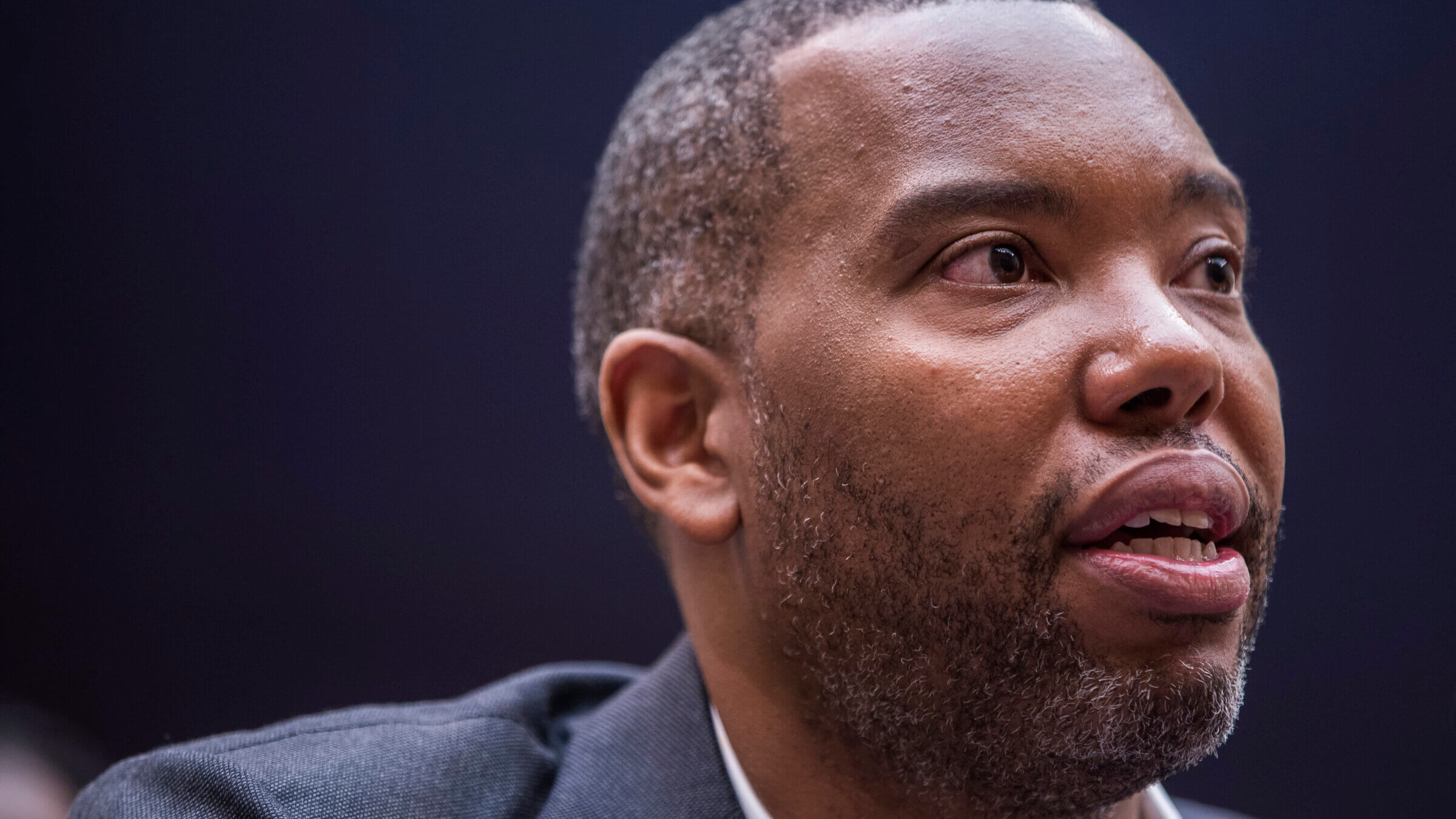Ta-Nehisi Coates says Harris funding Gaza war as first Black female president would be ‘nightmare’
‘It does not mean that you don’t vote for Kamala’ he tells Peter Beinart

Ta-Nehisi Coates has been calling Israel an apartheid state and accusing it of genocide during his book tour. Photo by Zach Gibson/Getty Images
Ta-Nehisi Coates, whose new book compares life for Palestinians to the experience of Black Americans under Jim Crow, said Thursday that if Vice President Kamala Harris does not change course from President Biden on Israel, she will be essentially asking American voters to accept “apartheid and genocide” in exchange for protecting women’s reproductive rights.
Coates, one of the nation’s foremost authors on racism, said he expects most people on the left to support Harris, and that he was “very happy” to see her take on Trump. But a Harris win, he said, created a “nightmare” scenario “of being the first Black woman president and having 2,000-pound bombs with your name on them dropping on Gaza.”
“It does not mean that you don’t vote for Kamala, and I think people are clear on that,” he said. But if a future President Harris maintained the American status quo on Middle East policy, Coates predicted, “a moral problem would become a practical problem” for Democrats in 2028.
“Effectively, what you are telling me is the price of protecting a woman’s right to choose is support for apartheid and genocide like that,” he said in an hourlong Zoom conversation with Peter Beinart, editor-at-large of the leftist journal Jewish Currents. “That is the rough math of what you are saying to me. There are women in Palestine too, you know?”
Coates, who gained national prominence a decade ago mainly through his writings on race at The Atlantic, has been on a media blitz around the new book, The Message, which consists of three intertwined essays based on his trips to Senegal, South Carolina and Israel and the occupied West Bank. Its arguments have been somewhat eclipsed by controversy over how Coates has been interviewed about it. In the Beinart event, Coates addressed some criticism of the book and explained how its core concern relates to the 2024 election.
Biden and Obama
He said that people he knows who know Harris say she has shown more sympathy for Palestinians than President Joe Biden. And he also was critical of former President Barack Obama, who he met with several times during his term in the White House.
Coates told Beinart he’d never spoken to Obama about Israel, but that it seemed the former president had felt unable to take political risks on behalf of the Palestinians.
“Looking back on his presidency,” Coates said, “he kind of acted like somebody who knew, but maybe — and now I’m getting into speculation — also felt that there was little he could actually do, right? Someone once told me, who knew him at a different point in life, said that not only did he know, but Bibi knew that he knew. And Bibi hated him for it.”

The missing piece
Coates also explained his decision to largely exclude historical context from his book — the primary line of criticism he has received about it, most notably in a Sept. 30 interview on CBS Mornings — and explained his thoughts on the Oct. 7 attacks.
Only the last of the three essays in the book pertains to Israel, and Coates has said that it was not intended to be a treatise on the region. It does not bring up Palestinian suicide bombings or rejection of various peace deals, he has said, because those are present in every other discussion of the conflict.
“The Zionist argument is not without its hearing,” he said at the event Thursday. “It’s everywhere. It is the air around us.”
Though it includes references to Theodor Herzl, Ze’ev Jabotinsky and the Israeli historian Benny Morris, Coates said he hopes his book can serve as a corrective to the absence of Palestinians from narratives about Israel — including one he wrote.
In his 2014 article in The Atlantic, “The Case for Reparations,” Coates touched briefly on German reparations to the state of Israel. A reader’s critique that the piece had ignored Palestinian subjugation stuck with him — and in some ways led him to travel to the Middle East and write The Message.
“I felt that I had erased the people,” Coates told Beinart. “That essay is about correcting that.”
‘I can’t look at that and not be horrified’
Coates spent 10 days in Israel and the West Bank in May 2023. He did not go to Gaza, and the book does not discuss Gaza, the Oct. 7 Hamas terror attack on Israel or the brutal war it spawned.
In interviews about the book, however, Coates has compared Oct. 7 to the Nat Turner Rebellion in 1831 — when a group of enslaved people led a rampage against their captors, murdering dozens of men, women and children. He told New York Magazine he does not support the Hamas attack, but recognized “Nat Turner happens in a context.”
Beinart asked Coates to flesh out the Nat Turner analogy, and whether he saw any dangers of making it. He started by saying he could not countenance the Hamas-led attack, in which 1,200 people were killed and some 250 kidnapped.
“I am not built in such a way that I can look at something like Oct. 7 and say, ‘Yes, they were under an oppressive system,’” he said. “And I feel like I can’t look at that and not be horrified. I just can’t.”
Turner argued that all white people involved in the system of enslavement were guilty, even children, because they would grow up to be enslavers.
“His analysis was not wrong,” Coates said. “Like, the logic of it is not incorrect. In fact, I would argue that the logic of Sinwar” — Yahya Sinwar, the Hamas architect of Oct. 7 — “is not wrong, but the morality of it — again, like, I always struggle with Nat Turner.”
He added: “The minute you start looking coldly upon the lives of people who are entrenched in systems, I wonder what the vision of your liberation is. Do I really want to live in a state run by you? Do I want to be part of a society in which you have power? I’m not sure I do.”














